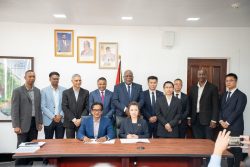Economic activity in the country expanded by 3.3 per cent in 2009, which demonstrated that the country weathered the impact of the global crisis well by regional and global standards,” the Executive Board of the IMF says.
A recent report from the International Monetary Fund (IMF), said that “newly released GDP series (re-based to 2006 prices) suggest that economic activity expanded by 3.3 per cent in 2009, compared to 2 per cent in 2008, largely on the back of a recovery in agriculture in the second half of the year along with continued strong gold production and robust activity in the non-tradable sector.” This “mitigated the adverse impact of global and weather shocks on output in early 2009,” the report said. Further it said that “end-year inflation fell to 3.6 per cent from 6.4 per cent” as of the end of 2008, which reflected the softening in world commodity prices.
According to the report, Guyana’s outlook remains positive in the near future with projected real GDP growth rates of 4.4 and 4.9 per cent in 2010 and 2011 respectively. “Growth is expected to benefit from the global recovery, the modernization of the sugar sector and the start up of investments project.”
Noting that the country’s financial system has not been directly affected by the global crisis, the directors welcomed current efforts “to further strengthen supervision and enhance the banking system’s resilience.” The directors urged the administration “to require banks to increase provisioning, monitor asset quality, and further tighten the legislation on the exposure to large borrowers and related-party lending.” It was also recommended that gradually “all non-bank financial institutions” be brought under a regulatory perimeter, similar to the way the supervision of the insurance industry was brought under that of the Central Bank.
The directors said that the strong fiscal consolidation “in 2009 provides space for a more gradual tightening over the near term to support infrastructure investment and growth.” In the report, the authorities were commended for their “intention to continue seeking highly concessional terms when contracting debt and to minimize fiscal risks from public investment and public-private partnerships (PPPs), while paying close attention to international best practices.” Continued efforts to enhance the quality of the assessment and fiscal accounting of public investment, were also praised. The directors also commended “the authorities’ commitment to reflect any firm or contingent liabilities related to the PPPs in the public debt statistics.”
Meanwhile, the directors praised the country’s Low Carbon Development Strategy (LCDS), which was described as an effort to achieve “sustainable long-term growth”. It was noted too that the “continued modernization of the sugar sector and diversification of Guyana’s productive base are key to sustaining growth.” The directors said it was important that GuySuCo implements its recovery measures so as to ensure that the Skeldon plant becomes fully operational in the near future.
The administration was commended for its “prudent monetary policy aimed at maintaining low inflation”. According to the directors, the exchange rate appears to be broadly aligned with fundamentals and the current exchange rate policy has served the country well. Looking ahead, some directors supported a gradual approach toward greater exchange rate flexibility, while others considered that “a more detailed assessment of the advantages of greater exchange rate flexibility in Guyana is needed.”









